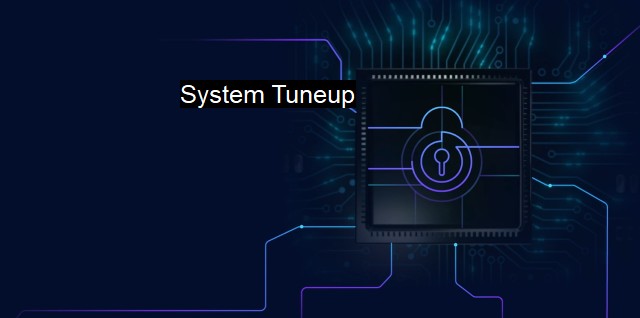What is System Tuneup?
Enhancing Cybersecurity: The Importance of System Tune-up for reliable Antivirus Protection
"System Tuneup" is a common term that gets tossed around quite frequently in the realm of cybersecurity and antivirus protection. It generally refers to the process of enhancing a computer or software’s performance, stability, and cleanliness by identifying and repairing issues that may contribute to a sluggish or error-prone operating environment. The intent is to optimize system performance by making modifications in the configuration settings, eliminating unused or obsolete files, and working to maximize the operating efficiency of hardware components.System Tuneup can be compared to a mechanic who regularly services a car, checking fluids, rotating tires, conducting complete system diagnostics, and replacing worn parts. Like a car, computer systems also require regular maintenance to perform optimally. This kind of maintenance often involves cleaning internally cluttered hard drives, resolving various performance-critical software issues, and securing the system against potential cybersecurity threats.
Consistently conducting a system tuneup is crucial not only from a performance viewpoint but also from a security perspective. With increasingly sophisticated cyber threats and internet-borne infections, system tuneups play a fundamental role in safeguarding the integrity of computer systems. It can work like a health check for a computer by spotting any vulnerable elements in the system and rectifying them.
The usefulness of system tuneups extends across different areas, but it is predominantly significant in the context of cybersecurity and antivirus defense. A clean system is less susceptible to cyber threats, viruses, and malware, which often exploit weaknesses present in an outdated or poorly maintained system.
System tuneups address the cybersecurity challenges by eradicating unneeded files or redundant software that may increase the surface area of attack for malware. By eliminating these elements, potential security holes or access points for a virus, malware, or hackers to infiltrate the system are reduced.
Tuning up a system typically involves updating the computer's operating system, various applications, and antivirus or security software to their latest versions. Regular updates often come with patches of identified security vulnerabilities, thereby tightening the defenses against potential breaching attempts.
For an antivirus standpoint, a clean and clutter-free system offers the best environment in which antivirus software can perform its work. Given that viruses and malware can hide in temporary files or operate in the system's background, removing these allows antivirus software to more effectively find and remove threats to the computer's integrity.
It's worth noting that performing system tuneups involves certain risks. Incorrect modification in system settings, deletion of critical system files, or improper updates can result in system instability or even data loss. Therefore, it is highly recommended that professionals perform these tasks or that adequate understanding of the system configuration holds for less experienced users attempting a system tuneup. System backups should also be created as a precaution before making significant changes.
The importance of systematic tuneups should never be underestimated. It extends far beyond routine system maintenance, fine-tuning performance, increasing processing speed, and free up disk space. It is a critical component of a robust cybersecurity and antivirus strategy. A system that is regularly (and properly) tuned up is likely to be more secure, stable, and operates at an optimal efficiency – a trifecta of benefits that appeal to all system users. understanding the procedures, risks, and the importance of backups are paramount before undertaking any tuneups. Regular system tuneups are considered best practice in secure computing, contributing to the overall health and longevity of both individual and networked systems.

System Tuneup FAQs
What is system tuneup?
System tuneup is a process of optimizing your computer's performance and fixing any system issues to ensure that your device stays efficient and secure. It involves various techniques like clearing temporary files, removing unnecessary programs, updating drivers, and optimizing settings.Why is system tuneup necessary for cybersecurity?
System tuneup is essential for cybersecurity because it improves your device's security and helps prevent security breaches. By optimizing your computer's performance and fixing any system issues, you reduce the risk of system crashes, which can leave your device vulnerable to cyberattacks.How often should I perform system tuneup?
It is recommended to perform system tuneup at least once a month to keep your computer running efficiently and securely. However, the frequency of tuneup also depends on how much you use your computer and what you use it for. If you use your computer heavily or for complex tasks, you may need to tune it more frequently.Can I do system tuneup myself, or do I need professional help?
You can perform system tuneup yourself, but it is always advisable to seek professional help, especially when dealing with cybersecurity issues. Professional antivirus software can help you perform system tuneup automatically and ensure that your device stays secure. Moreover, professionals can also identify any hidden vulnerabilities in your system that may require additional attention.| | A | | | B | | | C | | | D | | | E | | | F | | | G | | | H | | | I | | | J | | | K | | | L | | | M | |
| | N | | | O | | | P | | | Q | | | R | | | S | | | T | | | U | | | V | | | W | | | X | | | Y | | | Z | |
| | 1 | | | 2 | | | 3 | | | 4 | | | 7 | | | 8 | | |||||||